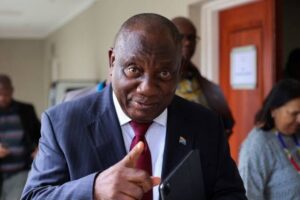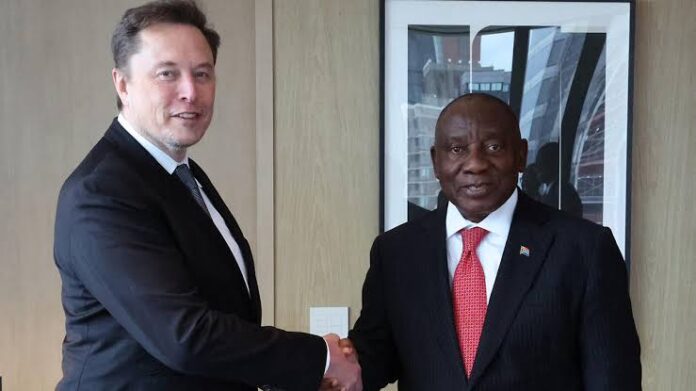South African President Cyril Ramaphosa has firmly denied recent claims made by tech billionaire Elon Musk suggesting that South Africa is promoting violence against its white minority population. In his weekly national address on Monday, Ramaphosa labeled the allegations a “completely false narrative,” adding that such rhetoric only serves to divide South Africans.
Ramaphosa’s comments come just days after Musk, who was born in South Africa, reposted a video on social media platform X (formerly Twitter) in which members of the opposition Economic Freedom Fighters (EFF) party chanted a controversial anti-apartheid song containing the phrase “Kill the Boer, the farmer.” The word “Boer” typically refers to Afrikaners, descendants of Dutch and French settlers, many of whom were historically linked to the apartheid regime.
Musk, reacting to the video, alleged that there is “a major political party in South Africa that actively promotes white genocide,” reigniting a long-running controversy over race relations and crime in the country. The post has since drawn reactions from international figures, including U.S. Senator Marco Rubio, who called the chant “a call to violence” and advocated for the protection of Afrikaners.
While Ramaphosa did not directly name Musk or others, his statement appeared to be a direct response to such claims. “We should not allow external events to divide us or pit us against each other,” he said. “We must challenge the notion that South Africa is a country where people are persecuted on the basis of their race or culture. That is simply untrue.”
The South African government has been increasingly vocal in recent weeks, working to counter what it calls a wave of misinformation, particularly following an executive order by U.S. President Donald Trump. That order, issued shortly after Trump came into office, halted U.S. aid to South Africa and extended the offer of refugee status to some Afrikaners, based on alleged persecution.
Also, read: Namibia Becomes First African Nation with Both Female President and Vice President
South Africa, a democracy since the fall of apartheid in 1994, has grappled with crime affecting all communities. Experts and researchers maintain that while attacks on farms—including white-owned farms—do occur, there is no substantive evidence that white South Africans are being systemically targeted. Official police data backs this up. Between October and December of last year, South Africa recorded nearly 7,000 homicides. Only a small fraction occurred on farms, and even fewer involved white victims.
The controversial EFF song at the center of the storm has a long and complicated history. Originally used during the anti-apartheid struggle, it has sparked legal battles in post-apartheid South Africa. While a court once ruled the chant constituted hate speech, a more recent 2022 decision concluded that the song, in its current usage, was protected under the right to freedom of expression, citing lack of evidence that it leads to real-world violence. The EFF maintains that the chant is symbolic and not intended to incite harm.
Nonetheless, the song continues to draw criticism across South Africa’s political spectrum. Some see its use as provocative and unhelpful in a country still working through its racial wounds. A number of Afrikaner organizations have pursued legal action to ban the chant once more, citing concerns for their community’s safety.
President Ramaphosa, however, emphasized that violent crime in South Africa is a national problem, not one divided along racial lines. “South Africans—Black, white, and all cultures in between—suffer from the burden of crime,” he said. “It is our shared responsibility to confront this crisis together, not allow distorted narratives to pull us apart.”
As tensions rise both at home and abroad, Ramaphosa’s message is clear: South Africa must resist efforts to inflame racial discord from outside forces, especially when those claims, according to local evidence and data, do not reflect the reality on the ground.

